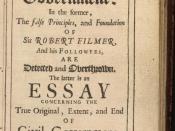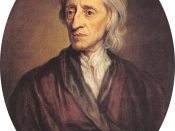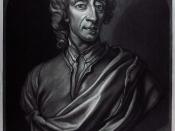Can't find it here? Try MegaEssays.com John Locke--Two Treatises On Government By: Kimi Marie Shibata 1 History 1AO6-Kimi Marie Shibata John Locke (1632-1704) an empiricist (science, fact based) "Two Treatises On Government" (1690) NATURAL LAW/STATE OF NATURE: ÷ Self-evident, universal laws, including inherent rights of life, liberty and property. (This influenced the American Constitution) ÷ In the state of nature, man is a TABULA RASA (blank slate), devoid of original sin, born neither good nor bad. Born free, innocent, with inherent rights. Evil instilled by environment, such as parenting and education. (This influenced 18th Century philosophes, who tried to change institutions, politics, social welfare in order to better society.) ÷ Although people are all equal from birth, sometimes age or virtue should give someone more power in certain situations: i.e./ Children are weak, powerless at birth. With a child in this imperfect state, the parents are obliged to take control, and to understand things for the child, until he/she is capable of reasoning and doing things him/herself.
÷ People give up their perfect state of free nature, along with some of their power, in order to gain security and protection of their property: i.e./ life, possessions, estate. They are also drawn together because of their basic nature to want to be with other humans, part of God's design. ÷ The three things lacking in a state of nature are: àAn established, settled, known law àA known and indifferent judge àPower to back and support the sentence when right FORMING A SOCIETY: ÷ If one enjoys the freedom and protection of a certain society, (Even if only for a day) he/she automatically becomes a part of it, and is obliged to follow its rules, whether or not he/she explicitly asks to join that society. 2 ÷...


